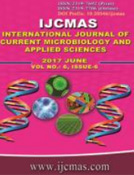


 National Academy of Agricultural Sciences (NAAS)
National Academy of Agricultural Sciences (NAAS)

|
PRINT ISSN : 2319-7692
Online ISSN : 2319-7706 Issues : 12 per year Publisher : Excellent Publishers Email : editorijcmas@gmail.com / submit@ijcmas.com Editor-in-chief: Dr.M.Prakash Index Copernicus ICV 2018: 95.39 NAAS RATING 2020: 5.38 |
The effect of thermal treatment on enzymes (viz. Polyphenol oxidase and Peroxidase) and nutritional properties (viz. Ascorbic acid, Antioxidant activity and Total phenolic content) of tender coconut water (Cocos nucifera) were studied during this research work. The process conditions for thermal treatment were temperature (80, 85, 90, 95 oC) and treatment time (2.5, 5, 7.5, 10 min). The results obtained from this study showed that the thermal treatment conditions had significant effect on ascorbic acid, total phenols, antioxidant activity, PPO and POD. Further, inactivation kinetics parameters (viz. D value and Z value) were calculated for PPO and POD at different temperatures. The complete inactivation of POD achieved after thermal processing at 95 oC for 5 minutes, though the experiment was continued up to 10 minutes because at this stage the PPO didn’t inactive completely. These results evident that the PPO was more heat resistant than POD in thermal treatment. Further, the results were compared with enzyme activity and nutritional properties of tender coconut water after UV-C treatment. From the results the study was conclude that, although the thermal treatment was better processing option pertaining to enzyme inactivation, but ultraviolet treatment was found superior based on retention of nutritional attributes.
 |
 |
 |
 |
 |